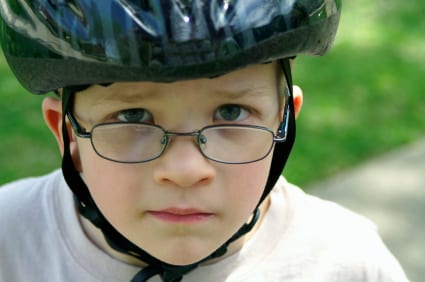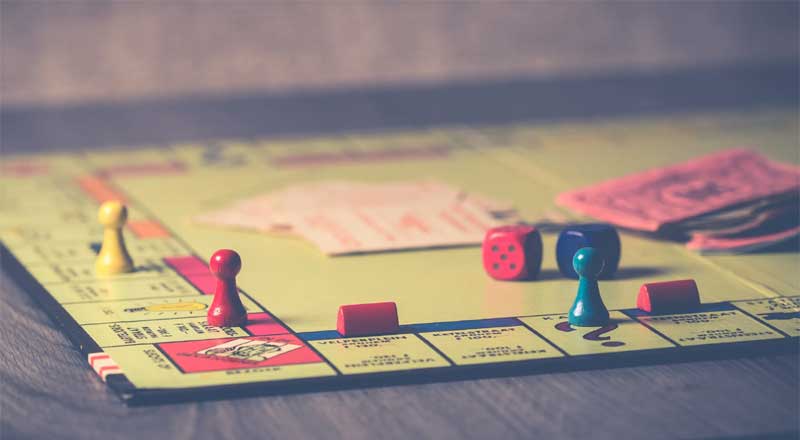 I’ve written several times before about how my son has amblyopia, which is also known as “lazy eye.” If you haven’t read my previous posts, amblyopia is a brain disorder in which the brain doesn’t process what one of the eyes is seeing. If left untreated, the eye will become weaker and weaker since it’s not being used (hence the term ‘lazy’), and eventually it will stop working all together, causing blindness in that eye. After a year of patching therapy – where my son wears a patch over his good eye in order to force the other eye to work – I’m thrilled to report that his vision has improved tremendously. A year ago, when he was diagnosed, his vision was 20/60 with glasses. Now, its 20/25.
I’ve written several times before about how my son has amblyopia, which is also known as “lazy eye.” If you haven’t read my previous posts, amblyopia is a brain disorder in which the brain doesn’t process what one of the eyes is seeing. If left untreated, the eye will become weaker and weaker since it’s not being used (hence the term ‘lazy’), and eventually it will stop working all together, causing blindness in that eye. After a year of patching therapy – where my son wears a patch over his good eye in order to force the other eye to work – I’m thrilled to report that his vision has improved tremendously. A year ago, when he was diagnosed, his vision was 20/60 with glasses. Now, its 20/25.
But just when I thought we were on the road to being “normal,” it turns out that my son’s got all kinds of other issues. It all started in June, when his kindergarten teacher pulled me aside one day and said his handwriting wasn’t progressing the way it should be. She suggested that, over the summer, I take him to a place that could help him get it down before school started in the fall. At first, I balked. His handwriting is fine, I thought. He’s only in kindergarten. There’s nothing wrong with him. But as the weeks went on, her comment stayed in the back of mind, slowly working on me. Finally, I decided to take him – once- if only just to prove her wrong.
I imagined that the place would be a handwriting turoring center, and so did my son (who was, shall we say, less than thrilled with the thought of handwriting work over the summer). He imagined rows of desks and a blackboard, with a teacher instructing the handwriting-impaired on how to properly form their letters. My mental image wasn’t all that different. But when we arrived on the first day, we were instead taken to a gym with tires hanging from the ceiling, monkey bars, a trampoline and a zip line. I wasn’t sure what this had to do with handwriting, exactly, but I agreed to let them assess him. He was taken through a series of exercises: walking on a balance beam, climbing a rock wall, jumping from side to side on the trampoline. Afterwards, we went to a smaller room, where they asked him to do jumping jacks, to write the alphabet while keeping his body still, and to copy the therapist when she put her right hand on her left knee and her left hand on her right ear. Imagine my surprise when I saw that he couldn’t quite do any of it.
I’ll spare you all of the details, but it turns out that because his brain had developed only seeing out of one eye, he had never developed a sense of balance, and the two sides of his brain just didn’t quite work together they way they were meant to. Plus, he had very poor upper body strength, which made it hard for him to do physical activity for long periods of time. Well. Lets just say that it was an aha moment for me, as his mother.
You see, my husband and I have been trying to teach him to ride a bike for years, but he’s always resisted us, and he gets hysterical when we make him try. He’s never been able to ride on a scooter, and whenever I make him go hiking with me, he complains that his back hurts and that he’s tired after ten minutes. I’ve always chalked this up to him just being lazy (in the case of hiking) or to him being anxious and afraid (in the case of everything else – see my previous posts on the poor kid and his anxiety). It had never even occurred to me that there might be a physical explanation for it all, yet there it was, staring me right in the face. And, I learned, all of this fed into his anxiety. When he was put in situations that required him to do things his brain couldn’t figure out – like certain puzzles, or physical activities – he went into panic mode and freaked out. Same thing for having to balance. He physically couldn’t keep himself from falling off of a bike, so he got anxious and melted at just the thought of having to ride one.
He might not have been able to physically balance, but when I heard all of this, I found myself more emotionally off balance than ever. The guilt I felt was overwhelming: my mind went to all of the times that I fought with him about just trying things, like getting on a bike, rollerblading, using a scooter, going skiing. But there was also fear: there’s something wrong with my kid’s brain. Mostly, however, there was enlightenment: no wonder he always gave me such a hard time and got into such epic fights with me about trying things. No wonder he never wanted to do anything if he didn’t know exactly what it would involve.
He’s been going to occupational therapy twice a week all summer now, and after two months of army crawls, rock climbing and hanging from monkey bars, he’s visibly stronger, and, more importantly, so much more confident in himself. The handwriting… well, that’s coming. But it’s his balance that’s really shown the most improvement.
I guess the moral of the story is that I’m glad I listened to his teacher (they really should pay teachers more, btw). I’m so relieved that we figured this out while his brain is still young and plastic enough to easily be re-trained. And I’m so grateful that in catching this early – in catching it at all – he’s going to be spared a lifetime of future frustration. Of course, you never want to hear that something isn’t right with your child, but at the same time, this sure explained a lot for me. In the end, really, I feel like I’ve been given a gift: I now have a deeper understanding of my son that I never would have had otherwise. It turns out that he’s not the only one who’s balance is getting better.





